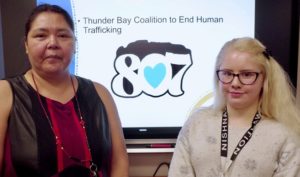Beendigen Anishinabe Women’s Crisis Home and Family Healing Agency workshop raises awareness on human trafficking

By Rick Garrick
THUNDER BAY — Participants learned more about human trafficking at Beendigen Anishinabe Women’s Crisis Home and Family Healing Agency’s Wi Na Wenjigaazo Anti-Human Trafficking Prevention, Awareness and Strategy Workshop on Jan. 24 in Thunder Bay.
“I have people in my life who are directly affected and indirectly affected by human trafficking,” says Janine Desmoulin, a Biigtigong Nishnaabeg citizen. “The more people that know what to look for and who are educated and have more awareness around the subject, the better. I’m just coming here as a community participant so I could spread awareness and have awareness. Now I feel up-to-date in my awareness, so I feel very honoured to be here and being part of positive change.”
Workshop presenters Cindy Paypompee and Maya Mounayer, both with Beendigen, delivered a range of information on human trafficking, including recruitment, how to recognize human trafficking and how to get help, during the workshop at Beendigen’s Healing Our Own Counselling Unit in the Victoriaville Centre.
“We don’t want people to get trafficked,” says Paypompee, family counsellor with Beendigen. “It’s a growing concern for Thunder Bay and I think awareness and prevention needs to happen.”
Paypompee says this was the largest Anti-Human Trafficking workshop to date, with a wide range of participants from across the community.
“Human trafficking doesn’t care what race you are,” Paypompee says.
Mounayer, anti-human trafficking assistant and family counsellor with Beendigen, says human trafficking victims usually show signs of fear, anxiety, depression, hyper vigilance or intimidation.
“They show signs of physical abuse such as injuries or bruises or sexual abuse,” Mounayer says. “They show signs of fatigue and have dark circles under their eyes. Trafficked victims work very long days, usually they work all the way up until 6:00 in the morning and start working again at 11 a.m., so they only have four or five hours of sleep every night because they are constantly working because the trafficker wants to make as much money off them as they can.”
Paypompee adds that trafficking victims sometimes have a quota to make a certain amount of money per day.
“They show signs of substance use or self-harm behaviour such as cutting,” Mounayer says. “They show signs of branding or scarring that indicates ownership by the trafficker.”
Paypompee says trafficking victims are often moved around to different locations.
“So by the time that a person may think they have seen a missing person they are already gone,” Paypompee says. “They get moved from city to city. Thunder Bay is one of six hubs in Ontario.”
Paypompee is also one of the co-chairs of the Thunder Bay Coalition to End Human Trafficking, which includes about 30 organizations from across Thunder Bay.
“We want to just bring awareness to our community,” Paypompee says about the Coalition. “And to kind of strategize on what ways we can have the community know this is happening.”
Mounayer says a conference on human trafficking awareness for rural communities will be held Mar. 4 at the Best Western Plus NorWester Hotel and Conference Centre in Thunder Bay.
“There is a huge gap in service provision in the northern communities in regards to human trafficking as well as having connections with the Canadian Human Trafficking Hotline [and] with having people in those communities that they can contact when they know somebody is struggling,” Mounayer says. “So we’re building those connections and networking.”
People can contact the Canadian Human Trafficking Hotline at 1-833-900-1010. Information is also available online.


